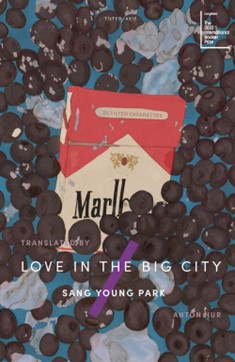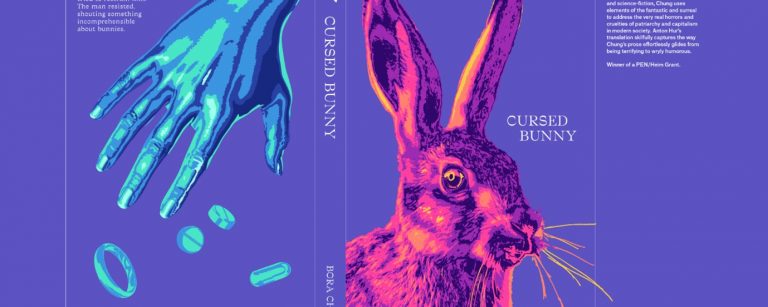The award-winning writer and translator Anton Hur, who will appear on two panels during the George Town Literary Festival 2022, talks about the authors he’s translated and the long road to publication.
By Yee Heng Yeh
Although literary translation, by his own admission, is something Anton Hur fell into (rather than something he consciously set out to do), he is no less prolific for that. By now Hur has translated a wide range of Korean literature, including two books that were listed for the International Booker Prize 2022: Cursed Bunny, a collection of short stories by Bora Chung, and Love in the Big City, a novel by Sang Young Park.
Through his writings and interviews, Hur comes across as someone effusive, frank, and thoughtful. He has, for instance, delineated his process of translation; elsewhere, he offers insights into the challenges of this field and queer Korean literature. In this interview, we dive deeper into his relationship to the works he translates, their authors, and his plans for the future.

Hur’s work setup. Photo courtesy of Anton Hur.
First, share with us your reaction upon learning that two books you translated have been listed for the International Booker Prize! How did the authors themselves react?
Disbelief on my end. Frank Wynne and Sophie Hughes have been double-longlisted before me, but you have to realise that Cursed Bunny and Love in the Big City were my first ever books that were eligible for the International Booker (my previous books were either published only in America or the author was dead) so it was more surreal than anything else. I kept expecting to wake up from a dream. Bora Chung was really happy for me—I think she was more excited about me being double-longlisted than for her own nomination! And Sang Young Park was very pleased for me, too, he sent me some nice messages. He also posted an Instagram story of himself holding a champagne flute and I almost cried because he looked so happy.
You spoke of how translating Love in the Big City is particularly important to you because the novel affirms your own specific experiences as a queer man in Seoul. How vital do you think such lived experience is for a translator to have?

Cover of Love in the Big City. Publisher: Tilted Axis Press.
I don’t think it’s essential by any means, but it’s very interesting when it happens. Translating a narrative that you have nothing in common with is also interesting, but in a different way. My point in the translator’s note you refer to is more in line with what Sang Young is saying in his author’s note about the inevitable inadequacy of literature to keep up with changes, and yet the simultaneous compulsion to put down our experience in words and the satisfaction it gives us. Sang Young himself has said he does not require his translators to be gay or Korean or anything, he respects that each translator brings a different set of talents to the table. And I happened to have brought my experience and identity to this particular table.
You’ve mentioned that translators have to figure out how an author will sound like in the target language. I imagine this is especially true with someone like Bora Chung, who has such a distinctive voice. How do you go about that? Is the decision more instinctive or deliberate?
It’s a bit of both. Having met Bora and Sang Young, I know what they sound like and I compare them to their written texts. That’s a useful thread to have. Other threads are authors they like. Sang Young and I especially have a lot of English reading in common, and that was helpful in figuring out how he might sound like in English. He has a wonderfully ironic voice, very cosmopolitan, very different from most Korean prose, which tends to eschew all forms of humour. Bora was trickier because a huge chunk of her influences come from Slavic literature, a lot of which hasn’t been translated into Korean or English or French (the languages I read in). That triangulation, what you see in the English Cursed Bunny, was more instinctual than deliberate compared to Love in the Big City. But I was very sure I knew what she was doing on the page and so I could tease out the horror in the humour, the hope from the despair.
I find it really interesting that you choose to ‘translate the work that [you] “hear” the English for’. Do you ever read with the intention of scouting for your next translation project, or does the translating impulse arise unpredictably? Are there particular forms or genres of writing you gravitate towards?
I try to read as widely as possible because for me, reading is not a hobby that I do for fun, it’s part of my job. No translator worth their salt sits around on their butt waiting for someone to drop translation jobs on their lap, you have to be constantly reading and querying. Even when someone does happen to drop a contract on your lap, I’ve found in such cases that it puts you at a weird disadvantage when it comes to negotiating your contract anyway. I still consider myself a self-directed translator who mostly seeks out their own projects, although the Booker attention has made me more visible to people who may not have known I existed or thought much of me. I enjoy being asked to do work by authors who never took me seriously before I got nominated for some fancy prize; it’s fun turning them down.
For terms or concepts without a direct cultural/linguistic equivalent, how do you decide to what extent you should “explain” them? When to use transliteration/translationese and when to opt for something more idiomatic?
It’s completely instinctual. I asked Arunava Sinha the same thing because he’s the best at it, and that’s what he said.

Cover of Cursed Bunny. Cover design by Jaehoon Choi/Studio Werk. Publisher: Honford Star.
Being a translator goes beyond translating—you also have to perform lots of unpaid labour in obtaining rights, creating samples, pitching, communicating, sourcing funding, etc. How can the publishing industry better support literary translators?
There needs to be a system that funds samples and a better apparatus for representing authors and translators on the World Anglophone stage. We need agents, in other words. A lot of people think the Literary Translation Institute of Korea acts like a literary agent for Korean authors and translators, but they don’t do a stitch of that work. All they do is give foreign publishers money after the publishers have accepted the work, and they do nothing to help translators get to that point. I’ve talked to them again and again about the specific kind of support we need, but they don’t care. The only global project that funds samples that I can think of is PEN Presents at English PEN, but even they can’t do everything on their own. At this point, I think the best thing would be to fund literary agents, maybe. It’s absolutely frustrating out there and I don’t know how long I can do this work, to be frank.
Seeing that you’ve taught translation—what’s a common mistake or misconception you see amongst new translators?
That if they’re talented enough, a magical publishing fairy will drop a book on their laps and all they need to do is translate. Again, that almost never happens. YOU are the magical publishing fairy. YOU have to find the book, negotiate the right to sample it and submit it, and YOU have to see it through the long road to publication. Sure, there are a lot of talented translators. But talent is a necessary condition of success, not a sufficient one. You also have to know how to network, present yourself, build up your credentials, and engage in the sordid arts of commerce. If you’re not interested in doing that, I recommend pivoting to academia.
Being a writer yourself, how have you been influenced by the writers you’ve translated, if at all?
I honestly don’t know. I’m sure I’m very, very influenced, but it’s not something that’s very apparent to me. I admire Kyung-Sook Shin and Bora Chung and Sang Young Park and Baek Sehee, but I’m not sure if I write like them by any means. Hopefully I’ve learned from Kyung-Sook Shin’s patience and empathy, Bora Chung’s wit and sense of justice, Sang Young Park’s irony and honesty, and Baek Sehee’s clarity and courage. I’ve always believed in the basic intertextuality of all books, and there are many, many influences no doubt running through my written work. I have a whole short story where Bora is a character in it, so there’s gotta be something of her that affected me enough to write that (“Fictional Notes Towards an Essay in Translation” is available on Asymptote Journal).
Video link: https://www.youtube.com/watch?v=PelduFrRTG0
The Literary Translation Institute of Korea’s video interview with Hur.
What are you working on at the moment?
My agent is about to sell my English novel, and I’m also being commissioned to write a novel in Korean. I’m also writing a non-fiction book about translation for a Korean publisher, also in Korean. So I guess I’m working on becoming a bilingual author at the moment. I’m still going to be a translator though, and I have three translations coming out in 2023, including a new Kyung-Sook Shin. But I may have to step back a little as a translator after that. It’ll be so hard to do so! There are so many amazing books to translate.
What do you look forward to doing in Penang?
I love Southeast Asia, I really think it is the superior Asia. I graduated high school in Thailand, my spouse is Thai, and if it weren’t for their job, we would be living somewhere in the ASEAN states right now. I’ve never been to Malaysia—I know, I’m so awful—but I’ve received the loveliest messages from Malaysian readers and book bloggers over the years and I’m dying to meet them in person. Koreans love visiting Malaysia. The translator Sung Ryu adores Penang and sent me a whole spreadsheet of her favourite Penang restaurants, so the plan is to check them off one by one while we’re there. So those two things, basically: meet the Malaysian literati and eat great Malaysian food.
GTLF 2022 Panels
On Translation: Bilal Tanweer, Anton Hur, Nguyen An Ly (moderated by Adriana Nordin Manan)
Date: 24 November 2022, Thursday
Time: 2:00–3:00pm
Venue: Bangunan UAB—Event Hall (Ground Floor)
Conversation: Cursed Bunny—Bora Chung & Anton Hur (with Amalina Kamal)
Date: 25 November 2022, Friday
Time: 2:00 pm–2:45pm
Venue: Bangunan UAB—Multipurpose Hall (1st Floor)
Yee Heng Yeh is a writer and translator. His work is featured on The KITA! Podcast, adda, Strange Horizons, Nutmag, Nashville Review, and Guernica. He is on Twitter @HengYeh42.

